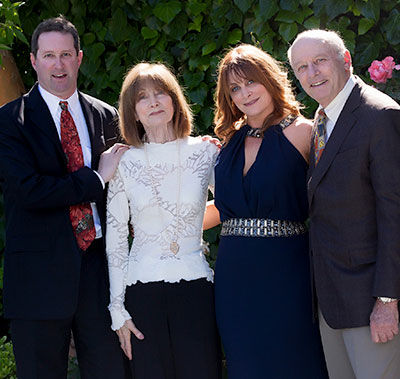
Arthur Schapiro, MD '62
An Ear for Medicine
For Arthur Schapiro, MD '62 being a doctor starts with listening to the patien.
"The biggest problem in medicine today is the lack of patient-provider communication," says Arthur Schapiro, MD '62, a Los Angeles urologist who has spent 40 years in private practice. "That leads to poor compliance and poor outcomes."
Many people share that view, but for Dr. Schapiro, it seems to grow directly from what he calls "the two best things that have happened to me in my life – my wife and attending Einstein."
Dr. Schapiro's wife, Tobie, whom he met during his medical residency at UCLA, is a Holocaust survivor who was liberated from Bergen-Belsen when she was ten years old.
"She had no education and no nutrition, yet she went on to earn three master's degrees and work for 20 years as a school psychologist in East L.A.," he says. "Our two children have grown up to be good and successful people, and that's mainly because of her."
Beyond inspiration, Tobie has also given Dr. Schapiro insight into how experience shapes both character and health. Her enduring faith in human nature may owe in part to a German colonel who intervened three times to save members of her family. Yet she also carries scars: the pandemic was deeply re-traumatizing for her, her husband says, "because it was like being locked up all over again."
Einstein, where Dr. Schapiro enrolled in 1958 after briefly working as a movie extra, also gave him a deep appreciation for human diversity and individuality. Faculty put a lot of emphasis on taking patient histories and other aspects of communication. More broadly, says Dr. Schapiro, who was born in New Haven but grew up in southern California, New York City – and Einstein in particular – attracted smart, competitive people from around the world. The school "gave opportunities to a wide range of people who otherwise, at that time, would have been deprived of careers in medicine."
Dr. Schapiro was awed by faculty members such as Salome Gluecksohn-Waelsch, a German-born Jewish geneticist, considered the founder of mammalian developmental genetics, and Ernst and Berta Scharrer, husband-and-wife researchers who helped launch the field of neuroendocrinology.
"These were people who'd overcome incredibly challenging circumstances, had lofty goals and were so charismatic in how they taught," he says. "They cared about education, and they treated students like family."
They were also deeply committed to helping those most in need.
"People were not monetarily motivated – they cared about medicine," he said.
Einstein also affirmed Dr. Schapiro's decision to go into surgery. At that time, students in their final year could spend six months working anywhere in the world. Dr. Schapiro, who wanted to work at UCLA, asked David State, then Chairman of Einstein's Department of Surgery, to write a letter on his behalf.
"He said, —Are you sure you want to be a surgeon?' I said, —Yes, but I'm not sure I can do it.' He said, —Good. It's the people who are too confident that get in trouble.'"
Dr. Schapiro had no doubts, though, about his interest in urology. The field was becoming increasingly sophisticated, with better tools and studies that were breaking new ground. He was interested in kidney transplantation, and at that time, when there was not yet a separate field of nephrology, "urologists did it all – kidneys, bladders, stones, genital surgery."
With job offers from the University of Oregon and the University of California at San Francisco, Dr. Schapiro could have pursued that interest. But he and Tobie were happy in southern California. He went into private practice with an older urologist, a decision he has never regretted. But he stayed on as a visiting clinical instructor in UCLA's urology department, where, at 87, he still teaches a weekly introductory course to third-year students.
"I've really enjoyed making the rounds with residents, going to conferences. There's a great camaraderie, and you're always meeting people and learning from them."
His other great interest has been Einstein. Dr. Schapiro, whose older brother Melvin, MD '60, and son, Jeff, MD '92, are also Einstein graduates, served for several years as alumni association president, drafting the first bylaws and formalizing what, until then, had been chiefly a loose volunteer network.
"If Einstein is going to be a national presence, it has to be active in southern California," he says. "We need to involve more alumni and recruit more students from the region. That takes more than the occasional brunch."
To that end, and also spurred by the Supreme Court's recent decision striking down affirmative action in admissions decisions, Dr. Schapiro recently made a generous planned gift to Einstein, specifically designed to create a scholarship for a student from southern California who is traditionally underrepresented in medicine.
By making a planned gift that will establish the Schapiro Family Scholarship in honor of his family, including Tobie, Jeff '92 and the Schapiro's daughter, Liza Browne, at the College of Medicine, The Schapiro Family are now also inaugural members of the Albert Einstein Legacy Society, which celebrates individuals — alumni, faculty, staff, and friends — who wish to advance the Einstein's mission through a legacy gift in their estate plans.
Ultimately, he wants all medical students to come of age in the same kind of thinking, caring environment that shaped him.
"I'm having lunch this week with two of my old classmates, and we all still talk about what a wonderful education we had," he said in early July. "We were given good values, like listening to the patient. I want today's students to have that same experience."

